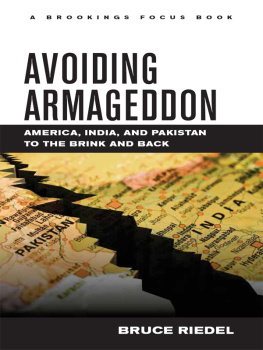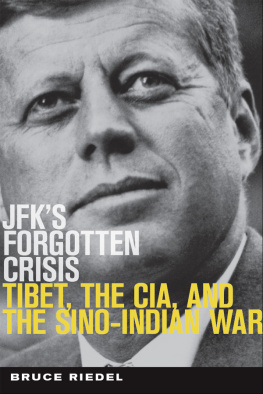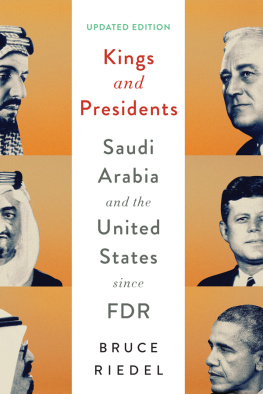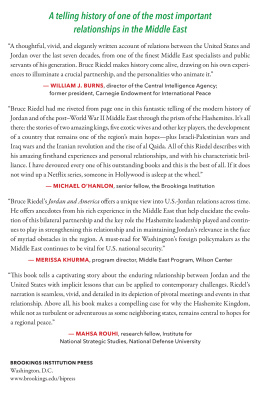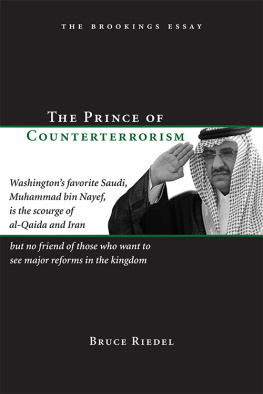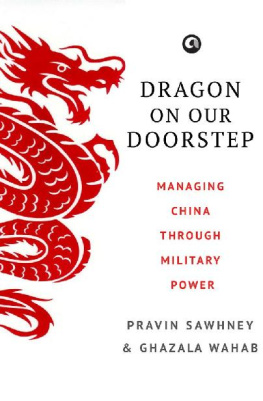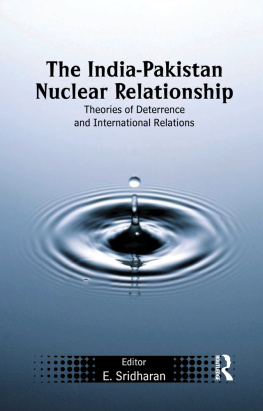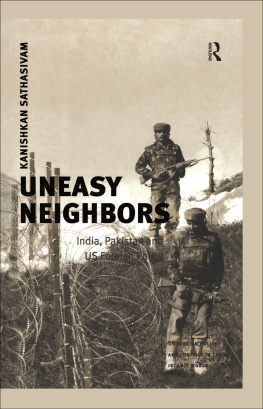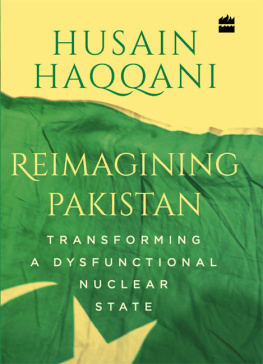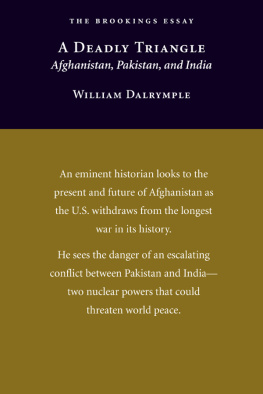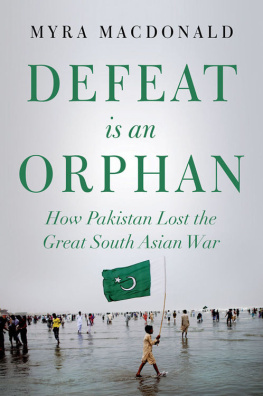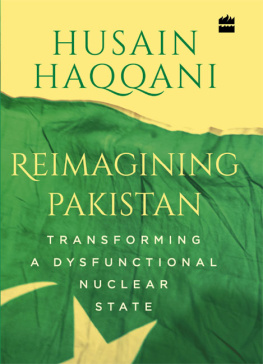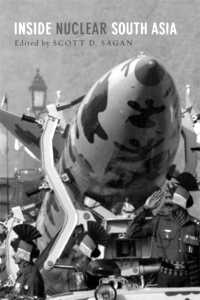I ndia and Pakistan will be among the most important countries in the twenty-first century. In Avoiding Armageddon, Bruce Riedel clearly explains the challenge and the importance of successfully managing Americas affairs with these two emerging powers and their toxic relationship.
Born from the British Raj, the two nations share a common heritage, but they are different in many important ways. India is already the worlds largest democracy and will soon become the planets most populous nation. Pakistan, soon to be the fifth most populous country, has a troubled history of military coups, dictators, and harboring terrorists such as Osama bin Laden.
The longtime rivals are nuclear powers, with tested weapons. They have fought four wars with each other and have gone to the brink of war several times. Meanwhile, U.S. presidents since Franklin Roosevelt have been increasingly involved in the regions affairs. In the past two decades alone, the White House has intervened several times to prevent nuclear confrontation on the subcontinent. South Asia clearly is critical to American national security, and the volatile relationship between India and Pakistan is the crucial factor determining whether the region can ever be safe and stable.
Based on extensive research and Riedels role in advising four U.S. presidents on the region, Avoiding Armageddon reviews the history of American diplomacy in South Asia, the crises that have flared in recent years, and the prospects for future crisis. Riedel provides an in-depth look at the Mumbai terrorist attack in 2008, the worst terrorist outrage since 9/11, and he concludes with authoritative analysis on what the future is likely to hold for America and the South Asia puzzle as well as recommendations on how Washington should proceed.
BROOKINGS FOCUS BOOKS
Brookings Focus Books feature concise, accessible, and timely assessment of pressing policy issues of interest to a broad audience. Each book includes recommendations for action on the issue discussed.
Also in this series:
Fast Forward: Ethics and Politics in the Age of Global Warming
by William Antholis and Strobe Talbott
Brain Gain: Rethinking U.S. Immigration Policy
by Darrell M. West
The Next Wave: Using Digital Technology to Further Social and Political Innovation
by Darrell M. West
The Pursuit of Happiness: An Economy of Well-Being
by Carol Graham
Bending History: Barack Obamas Foreign Policy
by Martin S. Indyk, Kenneth G. Lieberthal, and Michael E. OHanlon
The Opportunity: Next Steps in Reducing Nuclear Arms
by Steven Pifer and Michael E. OHanlon
Mr. Putin: Operative in the Kremlin
by Fiona Hill and Clifford G. Gaddy
A BROOKINGS FOCUS BOOK
AVOIDING ARMAGEDDON
AMERICA, INDIA, AND PAKISTAN TO THE BRINK AND BACK
Bruce Riedel
BROOKINGS INSTITUTION PRESS
Washington, D.C.
ABOUT BROOKINGS
The Brookings Institution is a private nonprofit organization devoted to research, education, and publication on important issues of domestic and foreign policy. Its principal purpose is to bring the highest quality independent research and analysis to bear on current and emerging policy problems. Interpretations or conclusions in Brookings publications should be understood to be solely those of the authors.
Copyright 2013
THE BROOKINGS INSTITUTION
1775 Massachusetts Avenue, N.W., Washington, D.C. 20036
www.brookings.edu
All rights reserved. No part of this publication may be reproduced or transmitted in any form or by any means without permission in writing from the Brookings Institution Press.
Library of Congress Cataloging-in-Publication data
Riedel, Bruce O.
Avoiding Armageddon: America, India, and Pakistan to the brink and back / Bruce Riedel.
pages; cm. (Brookings focus books)
Summary: Traces the history of the United States, India, and Pakistan as British colonies and their interaction in the twentieth and twenty-first centuries, particularly in regard to relations between India and Pakistan, nuclear proliferation, the global jihad movement, and U.S. diplomatic efforts to stabilize conditions on the subcontinentProvided by publisher.
Includes bibliographical references.
ISBN 978-0-8157-2408-7 (hardcover: alkaline paper)
1. United StatesForeign relationsSouth Asia. 2. South AsiaForeign relationsUnited States. 3. IndiaForeign relationsPakistan. 4. PakistanForeign relationsIndia. 5. TerrorismSouth AsiaPrevention. 6. Nuclear arms controlSouth Asia. I. Title. II. Series: Brookings focus books.
DS341.3.U6R54 2013
327.73054dc23
2012046847
Composition by Cynthia Stock
Silver Spring, Maryland
This book is dedicated to my son, Christopher.
CONTENTS
PRESIDENT-ELECT BARACK OBAMA made his first substantive call to a foreign leader on November 28, 2008, amid terrible tragedy. India, the worlds largest democracy, was still in shock from an attack by ten Pakistani terrorists that had killed more than 160 people, six of them Americans, and wounded hundreds in the city of Mumbai, the countrys financial capital. Obama began his conversation with Prime Minister Manmohan Singh, who had called Obama just two weeks earlier to congratulate him on his stunning election victory, with words of condolence: I wish it was a happier time. America is with you in these days; all my hopes and prayers are with you today, and all the hopes and prayers of America. The prime minister responded by saying that the call meant a lot to him and to India. Your call is a ray of sanity in this time, he said, adding that their two countries needed to fight the curse of terrorism together. Then he told the president-elect that all indications point to Karachi as the launch site for this attack. I have told this to Pakistani President Asif ali Zardari. Obama noted that he was not yet sworn in as president but vowed that once in office, I will work with you to ensure this tragedy is never allowed to happen again.
Now, four years after the Mumbai attack, a great deal more is known about its perpetrators and objectives than Obama and Singh knew in 2008. It was the result of a very complex plot involving an equally complex cast of deadly actors. It was also a turning point in the history of Americas relations with India. For the first time, American and Indian citizens had been targeted together by the global jihad movement. For more than 200 years, America and India had been distant and often cold friends. The United States had watched with admiration Indias fight for independence from Great Britain and more recently its rise as a global power, but there had also been many years of tension between Washington and New Delhi. Now, for the first time, the two had a common enemy. As the president-elects adviser on South Asian issues during the campaign and the transition and as the note taker for this call, I felt that history was changing in front of me.

